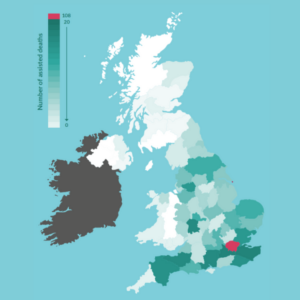 A new report published today by the Assisted Dying Coalition shows the true inadequacy of our assisted dying laws in forcing many UK citizens to choose an assisted death in Switzerland. My Death, My Decision urges politicians to read this report and support an assisted dying law that recognises intolerable suffering and makes these journeys to Switzerland unnecessary.
A new report published today by the Assisted Dying Coalition shows the true inadequacy of our assisted dying laws in forcing many UK citizens to choose an assisted death in Switzerland. My Death, My Decision urges politicians to read this report and support an assisted dying law that recognises intolerable suffering and makes these journeys to Switzerland unnecessary.
The research outlines the continuous flow of UK and crown-dependency residents using assisted dying services abroad — an increase which will only continue in the absence of a compassionate assisted dying law.
For the first time, this report publishes the breakdown of where UK and Crown Dependency residents come from who have an assisted death at Dignitas:
| County | Assisted Deaths |
| Greater London | 108 |
| Kent | 20 |
| Surrey | 20 |
| Hampshire | 19 |
| Devon | 18 |
| East Sussex | 18 |
| Essex | 16 |
| Greater Manchester | 16 |
| Somerset | 15 |
| Norfolk | 12 |
| North Yorkshire | 12 |
| West Midlands | 12 |
More affluent regions see higher rates of individuals travelling to Switzerland. This is hardly surprising, given the approximate cost of £15,000 to do so. Counties that are also further from an airport, meaning travel is significantly more difficult and expensive, often see fewer assisted deaths.
The Assisted Dying Coalition, of which My Death, My Decision is a founder member, is the UK and Crown Dependencies coalition of organisations working in favour of legal recognition of the right to an assisted death.
My Death, My Decision advocates an assisted dying law based on the following:
Any adult of sound mind who is intolerably suffering from an incurable, physical condition and has a clear and settled wish to die should have the option of an assisted death.
The report also highlights data on the conditions from which people who go abroad are suffering, in many cases being neuro-degenerative conditions like Motor Neurone Disease. Many of them would not be classed as terminally ill or as having less than six months left to live, so they would be outside the scope of every law that has been proposed in the UK so far.
That is because those proposals have been based on the legislation introduced by the US state of Oregon in 1997. Under the ‘Oregon Model’, only people with a terminal illness who have fewer than six months left to live are eligible to choose an assisted death. Clearly, therefore, this report highlights that any assisted dying law must ensure that eligibility criteria are based on suffering, not months left to live.
Trevor Moore, Chair of My Death, My Decision said:
“This startling report by the Assisted Dying Coalition is further evidence that our current prohibition on assisted dying is outdated, discriminatory and unworkable. MPs will surely be concerned to know that some of their suffering constituents are fleeing abroad for an assisted death, while others who are not financially or physically capable of doing so must continue to endure avoidable suffering. We know that many politicians have constituents with conditions like Huntington’s and Motor Neurone Disease, who want and deserve the right to have a dignified death on their own terms.
We need a law that would have worked for the late Tony Nicklinson and Paul Lamb, the courageous, suffering men with incurable conditions who fought for the right to receive assistance for their self-determined death through the courts and whose Supreme Court challenges remain landmark cases.”
Notes:
Members of the MDMD team, as well as individuals affected by the current law on assisted dying, are available for interview upon request
For further comment or information, media should contact Nathan Stilwell at nathan.stilwell@mydeath-mydecision.org.uk or phone 07456200033.
My Death, My Decision is a grassroots campaign group that wants the law in England and Wales to allow mentally competent adults who are terminally ill or intolerably suffering from an incurable condition the option of a legal, safe, and compassionate assisted death. With the support of over 3,000 members and supporters, we advocate for an evidence-based law that would balance individual choice alongside robust safeguards and finally give the people of England and Wales choice at the end of their lives.

